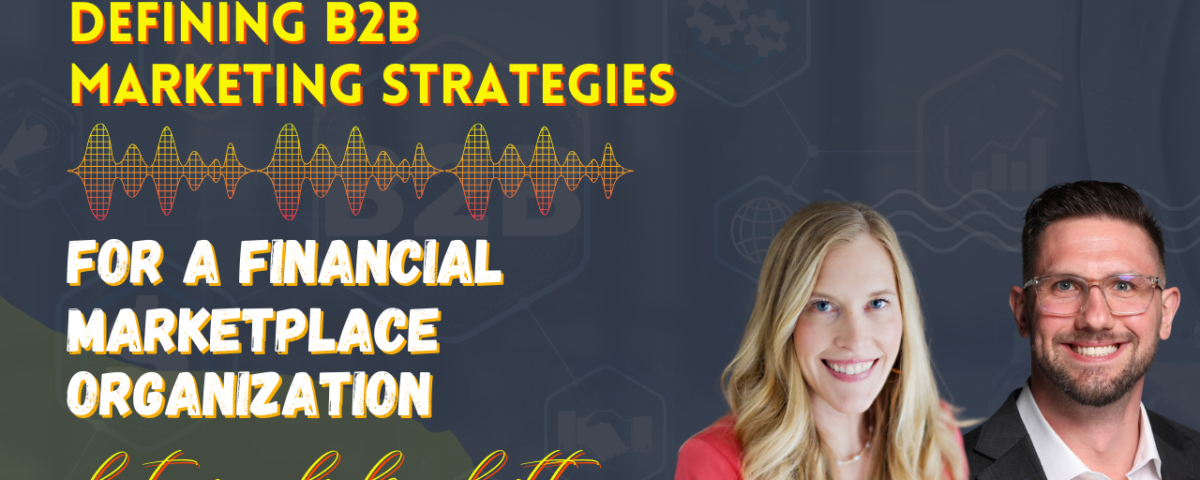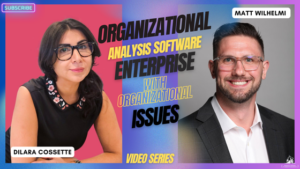Lindsay Britt is a distinguished fractional CMO with an MBA from Duke University. Lindsay specializes in supply chain SaaS and marketplaces, bringing her expertise to businesses navigating complex dual-sided markets.
This engaging conversation is hosted by Matt Wilhelmi, owner of Strategic Voyages Business Consultants and author of “Taboo Business Questions: What’s Haunting Every Entrepreneur’s Growth.”
Lindsay Britt and Matt Wilhelmi – Episode 1
In this episode, Matt is joined by Lindsay Britt to explore her journey and insights into effective marketing strategies. Lindsay shares her experience at CINC, a company specializing in real estate team growth. She explains how she led a successful rebrand and expansion effort, growing the marketing team and positioning the company for a successful exit to Fidelity National Financial. Lindsay elaborates on the challenges and strategies of managing a marketing team during rapid growth and acquisition phases. She highlights the importance of leadership stability post-acquisition and how CINC adapted to new opportunities and resources provided by their new parent company. This transition period is crucial for maintaining continuity and ensuring that leadership roles are preserved to facilitate a smooth integration. The discussion then shifts to the dynamics of marketplaces, with Lindsay explaining the dual challenge of managing both supply and demand sides. Using practical examples like Uber and Airbnb, she breaks down the concept of marketplaces and the complexities involved in balancing these two sides.
Matt and Lindsay delve into a case study involving a finance company in Florida seeking to optimize its supply side. Lindsay outlines her approach to identifying and addressing key issues in marketplace businesses, such as defining the Ideal Customer Profile (ICP) and implementing scalable marketing strategies. She emphasizes the need for a clear ICP, a structured sales process, and an effective marketing strategy to drive business growth. Throughout the episode, Lindsay provides valuable insights and actionable strategies to help businesses thrive in the complex world of marketplaces.
She also teases the next episode, where she will share cautionary tales and lessons learned from her extensive experience, including the impact of targeting the wrong ICP and inconsistent messaging.
Lindsay Britt and Matt Wilhelmi – Episode 2
Today, we focus on two significant cautionary tales that Lindsay has encountered in her career.
The first tale highlights the consequences of targeting the wrong Ideal Client Profile (ICP). Lindsay explains how misidentifying the right decision-makers within a company can lead to wasted efforts and poor conversion rates. She emphasizes the importance of continuously iterating on the ICP to ensure alignment with the market.
The second cautionary tale deals with the impact of inconsistent messaging. Lindsay discusses how discrepancies in communication across different departments can confuse customers and hinder conversion rates. She outlines the necessity of having a unified message that resonates throughout the entire organization to avoid such pitfalls.
Lindsay also shares practical advice on how to approach these common marketing challenges. From identifying the right ICP to maintaining consistent messaging, her insights are invaluable for businesses looking to refine their marketing strategies.
Matt adds his own cautionary tale about a passionate entrepreneur who aimed to outdo Yeti with a limited budget, underscoring the importance of realistic goals and adequate funding in ambitious ventures.
Lindsay Britt and Matt Wilhelmi – Episode 3
In this episode, Lindsay and Matt continue their discussion on a finance company from Florida, previously introduced in the first episode. Lindsay, who specializes in working with supply chain SaaS and marketplace companies, provides a detailed approach to solving three critical issues the finance company faces:
Lack of a Clearly Defined Ideal Client Profile (ICP):
Lindsay emphasizes the importance of understanding and defining the target audience. She suggests involving the leadership team in identifying the true value their product or service offers and ensuring it aligns with the right market segment.
Lack of a Sales Process:
Many startups rely heavily on founder-led sales, which can hinder scalability. Lindsay discusses the need for a structured sales process and the importance of gradually transitioning from founder-led sales to a more scalable model.
Absence of a Cohesive Marketing Strategy:
With no real marketing strategy in place, the finance company struggles to attract quality leads. Lindsay outlines the steps to develop a comprehensive marketing plan that includes understanding revenue goals, defining key performance indicators (KPIs), and ensuring consistent messaging across all channels.
Throughout the episode, Lindsay shares her strategic approach to creating and implementing a successful marketing plan. She highlights the significance of transparent communication with the executive team and the necessity of measuring success at each stage of the funnel.
Matt and Lindsay also discuss the importance of being top of mind for potential customers and the long-term investment required in building brand awareness. Lindsay’s insights provide valuable guidance for businesses looking to refine their marketing strategies and achieve sustainable growth.






